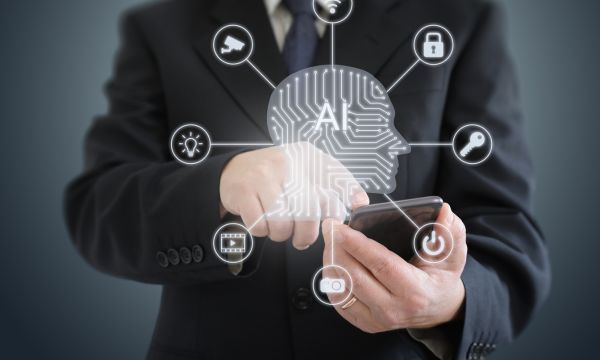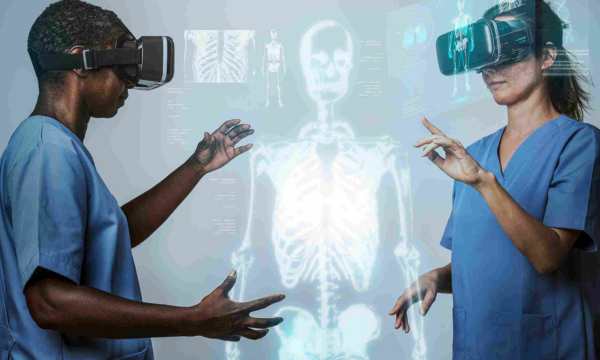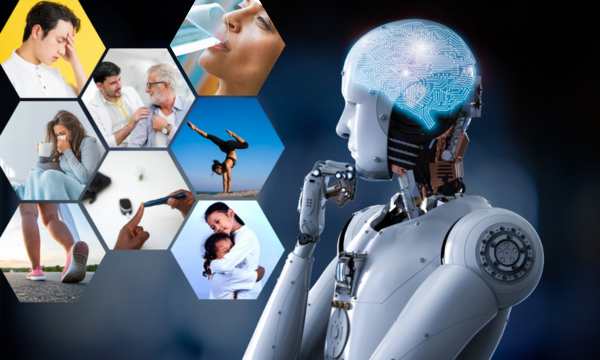As we enter the digital age, artificial intelligence (AI) is transforming many areas, but health monitoring is one of the most important.
Ad
Artificial intelligence is changing the way health diagnostics are performed, making diagnoses more accurate, faster, and more personalized.
This guide describes how artificial intelligence is impacting health testing, including its uses, benefits, issues, and future.
The rise of AI in health monitoring
Advances in machine learning, deep learning, and data analytics are enabling the application of artificial intelligence in health assessment. Many medical data, such as images, genetic information, and electronic health records, can be processed and interpreted using these tools.
Machine learning programs are used to detect trends and anomalies, which can aid in the early detection and diagnosis of diseases.
Key Applications of AI in Health Diagnostics
Medical imaging: AI is very good at looking at images from X-rays, MRIs, and CT scans to detect diseases such as cancer, broken bones, and brain problems.
Algorithms can spot subtle signs of illness that humans may miss, making early treatment easier.
Predictive analytics: Artificial intelligence looks at past data to make assessments about a person’s health and find people who may be suffering from certain diseases.
This enables preventative measures and personalized treatment plans, resulting in better outcomes for patients.
Pathology: AI helps pathologists examine tissue samples and detect changes that could indicate diseases such as cancer. This speeds up the assessment so that treatment can start on time.
Genomics: AI analyzes genetic data to determine how genes contribute to diseases, predict how each person will respond to treatments, and find individualized treatments.
Why artificial intelligence is useful for health diagnostics
Greater accuracy and efficiency: Artificial intelligence reduces human error and speeds up the diagnostic process so assessments can be made faster and more correctly.
Early detection of diseases: AI algorithms are important for preventive healthcare as they can detect diseases at an early stage, significantly increasing a patient’s chances of survival.
Customized medicine: Artificial intelligence’s ability to see complex genetic data makes it possible to tailor medications and tailor treatments to each person’s genes.
Reduce healthcare costs: AI can help healthcare systems save significant money by making testing faster and more accurate and targeting treatments more precisely.
Challenges and Ethical Considerations
While artificial intelligence has its benefits, using it for health diagnostics can be difficult. Concerns about data privacy, the need for large and diverse data sets to teach AI models, and the potential for algorithmic bias are all major concerns.
There is also the ethical issue of ensuring everyone has equal access to AI-powered medical devices.
The future of AI in health screening
Artificial intelligence can play an important role in health monitoring in the future. As AI technology continues to develop and data sets continue to grow, AI programs must become more accurate and useful.
Wearable technology will soon be able to connect to artificial intelligence systems for real-time health tracking, and artificial intelligence can reveal new information about complex diseases.
Applying AI to clinical practice
To apply artificial intelligence in clinical environments, technicians, healthcare providers, and scientists must work together. Setting rules for the ethical use of AI, ensuring data security, and building trust among patients are all very important steps.
To fully utilize AI in diagnosis, healthcare professionals will also need to continuously learn how to use AI tools.

Guide to AI’s Health Diagnostics Role (Source -Google)
Conclusion
The application of artificial intelligence in health diagnostics is an important advance in our discovery and treatment of diseases.
Artificial intelligence will transform healthcare by making diagnosis more accurate, allowing earlier detection of diseases, and opening the door to personalized treatment.
However figuring out how to deal with the problems and ethical issues that arise when using AI is important to get the most out of it.
As technology continues to evolve, artificial intelligence in health diagnostics can lead to a world where healthcare is more efficient, personalized, and accessible to all.
AI’s journey in health diagnostics is just beginning, and its ever-changing role continues to make medicine look at things in new ways.
If we embrace the benefits of AI while carefully addressing its problems, this technology will continue to improve patient outcomes and experiences for years to come.
FAQs
1. How can AI make diagnosis easier?
Artificial intelligence makes diagnosis more accurate by processing and studying large amounts of medical data faster and more accurately than humans.
It can spot trends, quirks, and connections that doctors might not see. This helps doctors make more accurate diagnoses and detect diseases earlier.
2. Can artificial intelligence replace doctors in diagnosis?
Artificial intelligence is not intended to replace doctors; This is to help them do their job better.
AI can provide us with useful information and help us make more accurate diagnoses, but we still need human doctors to make the final diagnostic choice, understand AI results in the context of patient care, and provide compassionate care.
3. What ethical issues arise when artificial intelligence is used to diagnose health problems?
Ensuring patient privacy and data protection, countering algorithmic bias, and keeping decision-making processes open are all ethical issues that need to be taken into account.
Furthermore, everyone must have equal access to AI-powered diagnostic tools so that all patients can benefit from technological advances in healthcare.
4. Can you trust AI health diagnosis?
As algorithms improve and data sets grow larger, artificial intelligence in health diagnoses becomes increasingly accurate.
However, how reliable something is also depends on the quality of the data used to train the AI model and how it is used in diagnosis.
To ensure that AI systems are reliable and trustworthy, they must be continually assessed against clinical outcomes.
5. How does artificial intelligence help people get better health diagnoses?
Artificial intelligence in health diagnostics can help patients detect diseases earlier, diagnose diseases more accurately and quickly, develop personalized treatment plans, and potentially even reduce medical costs.
Artificial intelligence diagnostics can help patients achieve better health outcomes and live better lives.
6. Where is Artificial Intelligence heading in health diagnostics?
As AI technology continues to develop and become more fully integrated into the healthcare system, the future of AI in health monitoring looks bright.
The future could see more personalized and accurate diagnostics, the ability to connect wearable technology for real-time tracking, and artificial intelligence insights into complex diseases that will provide even more help to patients.
7. In what ways can healthcare professionals use AI to support diagnosis?
Healthcare providers can add AI tools to clinical workflows by partnering with AI developers, paying for training of medical staff on the proper use of AI technology, and regularly testing AI diagnostic tools to ensure they are accurate and useful, using artificial intelligence in diagnosis.


